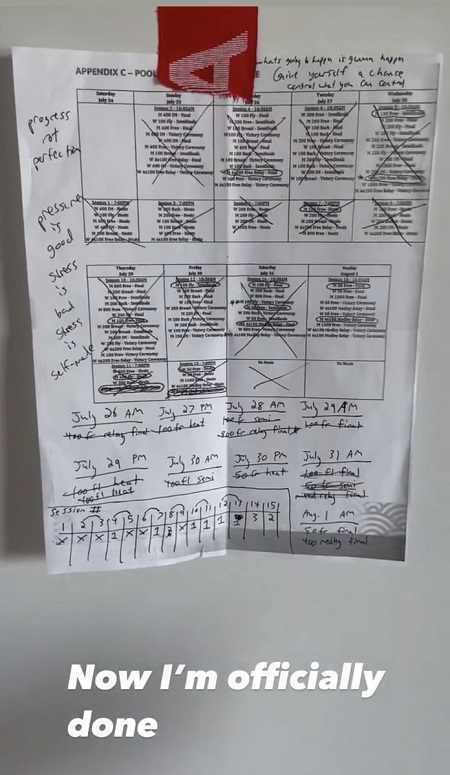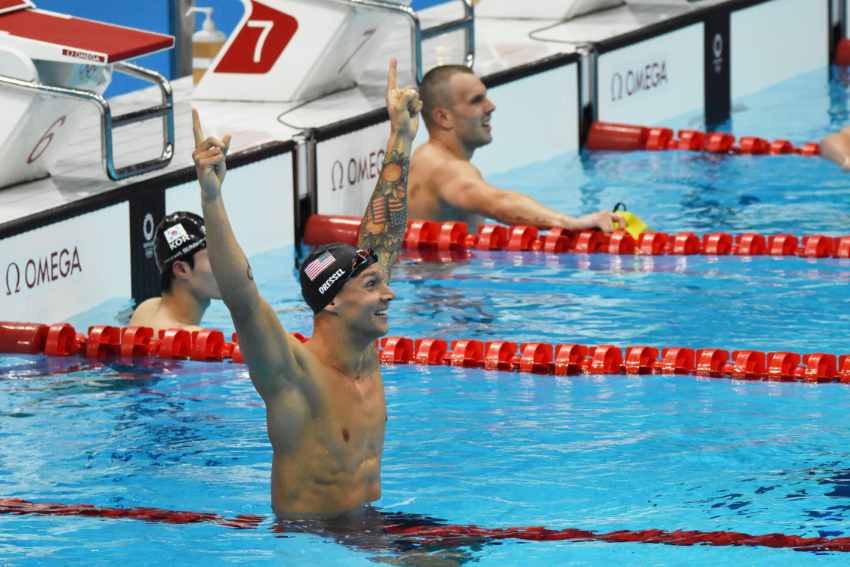How do you win five Olympic gold medals under intense pressure? By swimming one race at a time.
The timing of it all made the comparisons so easy that they wrote themselves.
After the Rio Olympics in 2016, Michael Phelps, the GOAT, retired from the sport.
Best of all time.
Hands down.
The following year, at the 2017 World Aquatic Championships, Caeleb Dressel has his big international breakthrough.
Dressel had been a superstar during his collegiate career at the University of Florida, but that week in Budapest was his first big showing on the international stage. Dressel’s week includes winning seven gold medals, rattling world records and posting world textile bests in the 50m freestyle (21.15) and 100m butterfly (49.86).
The only other swimmer to that point to win seven gold medals at Worlds?
You know who.
It didn’t take much imagination for commentators to start saying, “Welp, here’s the next Michael Phelps!”
The heir apparent.
And so, expectations were running at a frothy boil for Caeleb Dressel leading into Tokyo, the first time he’d be swimming at the Olympics in individual events.
With three individual races and a bunch of relays, with prelims, semis, and finals, Dressel’s calendar was busier than the warm-up pool.
And how did he manage the hectic schedule and pressure of the Olympics?
By taking things one swim at a time.
Nine Days, Five Golds, and a Sheet of Paper
In the days following Dressel’s gold medal performances in Tokyo (five in all), he was asked repeatedly how he’d dealt with the pressure.
The expectations.
Not only his own, but those of everyone else, too.
Over the nine days of swimming competition in Tokyo, Dressel competed in nine sessions and raced 14 times.
To help keep perspective on the job at hand, he printed out a schedule for the meet and circled the events he was swimming.
At the bottom of the page, he wrote the number of swims he had during each session, and along the sides of this sheet of paper he scribbled out some simple reminders for himself.
Control what you can control. Progress not perfection. Give yourself a chance. Pressure is good.
Each day when he left the pool, he would cross out a big X on the session.
He’d also cross out the swim(s) he did that day.

This simple act was one of the keys to his success that week in Tokyo.
“One thing that really helped during this meet, and I’ve done this before at other big meets,” Dressel told Good Morning America interview after the Olympics had wrapped up. “Every night I’d take my pen and cross out every session…. Before you knew it, I was quarter of the way done… Before you knew it, I was halfway done, and before you knew it, I had two days left. That helped a lot physically seeing how much I actually had left to do.”
After each swim, each session, he’d bust out a pen and cross out the session and the swim.
Done.
Next.
“For me, it’s taking it one race at a time.”
This strategy is more powerful than it looks.
And here’s why.
Keeps you mentally in place.
When we have a big task before us, whether it’s a massive test set at practice or a nine-day Olympic schedule, it’s easy to start time traveling with our thoughts.
When we aren’t present and in the moment, we open up the mesh bag of our past swims and future worries and start rooting around for things to overthink.
- That week of training I missed over the holidays is going to cost me.
- Last time I swam in this pool, I didn’t swim fast at all.
- I don’t feel as fast as I did the last time I went a PB.
- If I don’t go a personal best time tomorrow, this whole season will have been for nothing.
- I still have three more days of competition, how am I going to have the energy for it all?
Simply crossing out the day’s activities won’t completely remove those pesky thoughts or make you immune to worrying about the future…
But it will help you get better at being present with your thoughts so that you can spend more time delivering your full effort and concentration on the Next Lap.
And less time stressing out about things that haven’t happened.
Provides visual feedback on your progress.
There are lots of better-than-average reasons to write out your swim workouts (Dressel does this as well, having kept a detailed logbook since he was in high school), and a biggie is seeing progress on paper.
Each day, when Dressel crossed out a swim or a session, it was like a progress bar for a download or an app installation, steadily marching to completion.
There’s a reason that smartphones, apps, websites, and screens use progress bars (or spinny wheels, rotating egg timers, etc)—because they help you better perceive the task to help you complete it.
After all, if you see that you are making progress, and if you can see the progress bar chugging along, you are going to keep going!
Helps you bounce back when things don’t go well.
We’ve all had a swim meet where things did not go well on day one.
Maybe we were overly wound up, too nervous, didn’t sleep enough, feeling overwhelmed, but whatever the case, we dove in and had a smellier-than-a-moldy-pull buoy swim on the first race of the meet.
Being able to properly process a disappointing performance and bounce back is one of the key things elite swimmers do spectacularly well.
They have a short memory, learn on the fly and move on.
The simple act of crossing out a session or a swim is a way to help you do this.
It reinforces that feeling of, “This session/swim is behind me, it’s time to move on.”
For swimmers who get stuck dwelling on the past, or who frequently allow one bad swim turn into a stretch of bad swims, this can be a good habit to use to help break the chain and close the chapter on a frustrating performance.
This is a habit that Dressel didn’t just start in competition—he does the same sort of thing each night with a journal, where he writes about the things he’s stressed about and the things going on in his life.
And just like with the crossing off of the events and swims, once he’s put pen to paper, it’s time to move forward.
“When I close the pages, the problems—good or bad—are over, I learn from it, and move on,” says Dressel.
Take it one lap at a time
Sometimes the hardest thing to do in the world in the water is to keep things simple.
To ignore the noise and focus on right now.
But swimming one race at a time…
One practice at a time…
One lap at a time…
Will give you the best possible chance at success.
Recommended Reading
Want more help swimming like a champion in practice and on race day? I’ve put together lots of resources to help you swim faster under pressure.
How Caeleb Dressel Used a Logbook to Become the Fastest Swimmer on the Planet. The fastest man ever across 50 yards used a logbook to develop his insane speed and uncanny feel for the water. Here is how to make this tool work for you as well.
How Swimmers Can Get Better at Swimming Under Pressure. Swimmers often struggle to swim fast under pressure. Here are three things you can start doing at practice today to “choke proof” your swim meets.
9 Training Habits of Olympic Swim Champions. No matter how ambitious your goals are in the water, there are some powerful lessons you can steal from the best swimmers on the planet.














